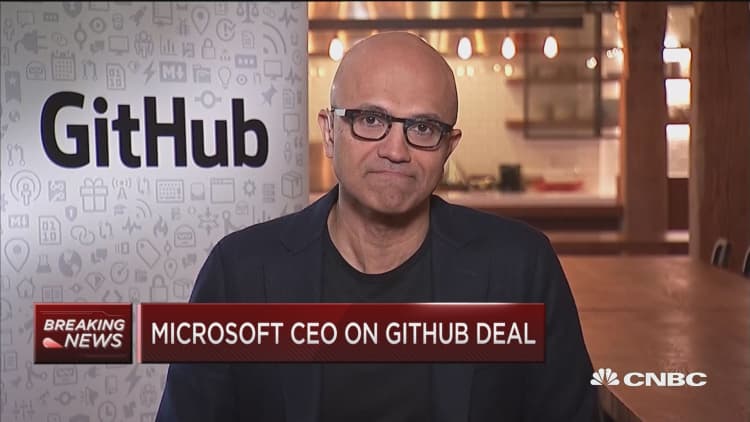Microsoft announced on Monday that it has agreed to acquire GitHub — an online platform where software developers store vast amounts of computer code — for roughly $7.5 billion worth of stock.
Executive chairman Chris Wanstrath, now 33, co-founded San Francisco-based GitHub in 2008 along with fellow software developers Tom Preston-Werner, 38, and PJ Hyett, 35. In a decade, the company has grown into the world's largest host service for software code, from more than 24 million individual users. GitHub, which told CNBC last year it was on track for $200 million in annual subscription revenue.
Forbes estimated Wanstrath's net worth at $360 million in 2016 when GitHub was valued at $2 billion. With Microsoft's acquisition of the company nearly quadrupling that, Wanstrath's personal net worth will likely also swell upon closing of the deal.

In a blog post on Monday, Wanstrath wrote that he "could have never imagined" the Microsoft acquisition when GitHub launched 10 years ago. "[GitHub] was a powerful but niche tool, clouds were just things in the sky, and Microsoft was a very different company," he said.+
Indeed, Wanstrath has come a long way from college dropout and self-taught programmer.
As a kid growing up in Ohio, Wanstrath tried teaching himself computer programming. "I wanted to be a developer, make video games and websites. I always wanted to be a part of a team building things that people love," he told Entrepreneur in 2017.
By the early 2000s, Wanstrath hadn't lost his love for computers, but he decided to major in English at the University of Cincinnati. "I figured whatever I did in life, I'd have to speak, read, write English," he said in an interview last year with Fortune's Michal Lev-Ram.
Still, he wanted to be a software developer.
"I don't ever think I thought that a degree was going to be necessary. I thought skills were necessary. All I wanted to do was start learning a lot," he said in a 2014 interview with the University of Cincinnati's magazine.
He took a couple of computer programming classes, which helped him get serious about software coding to the point that he felt he could turn it into a career.
The online community of developers using the PHP computer programming language, won over Wanstrath, as they offered help and encouragement when he was just learning to code. "They were trying to help share knowledge and build each other up and teach me things," he told Lev-Ram.
Wanstrath found himself "not going to school and skipping class," he told Lev-Ram. He was spending more time coding than studying, he said.
"Instead of doing drugs or whatever, I was programming. So, my parents were equally mad at me [as if I'd been doing drugs]," he told Lev-Ram.
After about two years of college, in 2005, CBS-owned tech website CNET offered Wanstrath a job. Because he was basically self-taught as a programmer, Wanstrath worried about his ability to succeed. But he decided to take the leap. He quit school to move to San Francisco and take the developer gig.
"Do 20 year olds think about risks?" Wanstrath asked during the interview with the University of Cincinnati's magazine.
At CNET, Wanstrath worked as a developer on projects related to the websites GameSpot and Chowhound, which were both acquired by the media company.
In October 2007, Wanstrath connected with Preston-Werner at a San Francisco meet-up for the community of developers working in the Ruby on Rails programming language.
Much like Wanstrath, Preston-Werner is a college dropout (he left Harvey Mudd College in 1999 after two years). Preston-Werner had previously founded a digital avatar startup, called Gravatar, that he sold to web developer Automattic in 2007 for an undisclosed amount.
The two discussed the software developer community's need for a service where large amounts of source code could be stored while users to collaborate with one another on their software projects.
"For the next three months Chris and I spent ridiculous hours planning and coding GitHub," Preston-Werner wrote in a post on his personal website in 2008.
Wanstrath and Preston-Werner launched a private beta version of GitHub in January 2008. The next month, they added their third co-founder in Wyett, who had worked at CNET with Wanstrath as a senior software engineer on the Chowhound project.
By March 2008, Wanstrath said in a blog post, GitHub already had 2,000 users for its beta version. GitHub launched for public use in April 2008 — a little more than a decade before Microsoft announced its acquisition on Monday. Once the site went public, GitHub caught on gradually within the developer community, reaching 100,000 users by July 2009.
With its popularity among software developers, GitHub was able to survive without outside funding for the better part of four years, charging individual programmers and businesses money for monthly access to the platform.
In 2012, GitHub finally announced its first outside fundraising. Silicon Valley venture capital firm Andreesen Horowitz put up $100 million in its largest-ever (at that point) investment. The firm said at the time that GitHub had been growing its revenue by 300 percent annually since launching.

Over the years, GitHub was named to CNBC's Disruptor List five times, with CNBC noting that the site has "been described as a Facebook for developers because it encourages collaboration and interaction around code." In addition to being used by millions of software developers around the world, GitHub is also used to host coding projects by large organizations, such as NASA, as well as businesses like Airbnb, IBM, and Spotify.
Wanstrath served as CEO until 2012, when Preston-Werner took control of the company. However a sexual harassment scandal forced Preston-Werner to resign and leave the company in 2014, with Wanstrath again taking the reins. In 2017, Wanstrath stepped down as CEO and took the role of executive chairman while GitHub searched for his successor.
Now, with Microsoft's acquisition, Wanstrath will be joining the tech giant as a "Microsoft technical fellow" where he will work on software-related projects, while Microsoft vice president Nat Friedman will take over the role of GitHub's CEO.
"I'm extremely proud of what GitHub and our community have accomplished over the past decade, and I can't wait to see what lies ahead," Wanstrath wrote on his blog on Monday.
Don't Miss:
After being laid off, this 35-year-old founded NerdWallet with $800 — now it's worth $500 million
Like this story? Like CNBC Make It on Facebook!


